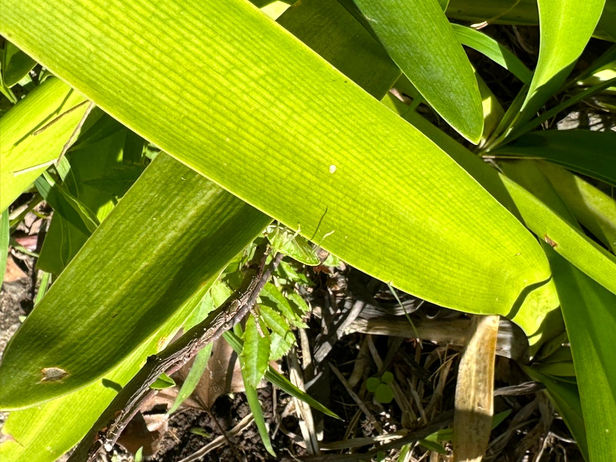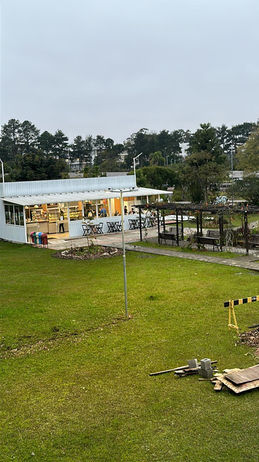
Summer Undergraduate International Research Experience

.png)
Week 3
-
The week of June 24th started really cold, and on a walk to my lab from my house, I found a beautiful stink bug struggling to move in the middle of the sidewalk. Empathizing with his struggle in the cold weather, I decided to take him on a tour of my lab, and after that I found him a sunny spot on a leaf. Fueled by coffee and spite, I spent the beginning of my week photographing and measuring more bug legs- which was a struggle for the smaller legs, which took a long time to position perfectly on the stand. I started to encase femurs in resin to be cut up and nano-indented sometime in the future, which was a fun arts and crafts moment. My labmate wanted to show me the Natural Museum at the University, but unfortunately we found that it was closed for rennovations. I was still able to sneak a peek and see a few cool specimens they have. Another lab invited me to demo a game they developed for a class- it was a knock-off version of Among us but with platelminths, interestingly. In the game, every player draws a card which can be a platwelminth of another creature, an imposter. Every round, the alpha platelminth chooses two players to reproduce, and they are given three cards of three tissues, two of which platelminths have, and one which only a non-platelminth has. Then, the two players choose a tissue that their animal has and if they are compatible to platelminths, they can reproduce and get to the next round. It is a convuluted game to learn at first, but incredibly fun once you get the hang of it.
Halfway through the week, I started to cut legs so I could micro-indent them in the following week. It was really fun to saw the little legs, but also lots of work since they had to be perfectly even and filed to have an even surface perfect to indent. During the weekend, I went to the Cajuru Regional Farmer's Market with my roomate, where we found lots of delicious fresh fruits and veggies. On the way back I met a cute and friendly dog that followed me half-way back home.
Something that surprised me
I have heard before Brazil being called a third world country. I could not disagree more. Brazil is such a rich country, rich of culture and beauty that historically has been abused by world powers. We are very looked down on in terms of science and technology, but being here in an academic environment I am inclined to say that such notion is wrong. I have met numeruous incredibly driven and intelligent people, mentors and students alike. I have noticed that undergraduates, at least in the EvoMorfo lab, are not only incredibly smart, but more prepared than plenty of undergraduates in my cohort at UF. My first week I saw student fully analyzing their own data in R, planning projects and writing articles of previous research they have done. Every undergraduate student has their own project which they came up with. A big difference in brazilian universitites is the way they shape and form students into researchers. In the US (or at least UF), most mentors use undergaduates as extra hands for their research, and we tend to participate in their projects mostly in data collection rather than creating the project from scratch. This makes sense for bigger labs that have greater expectations in terms of output, but ends up creating studetns that are not researchers, but simply extra hands. Here, on the other hand, many professors believe in aiding their students in what they want to do. Forming their ideas into concrete projects and offering help along the way. It was surprising to see, as it is so common to see people mentioning latin countries as less strong in research. I believe this comes from a lack of resources much more than inability or lack of talent. It seems that Brazil has tons of international partnerships, and it is very common to have master's and doctorate students who do what is called a "sandwich", they do part of their education in Brazil and part of it abroad. This is not seem common in the US, as I had never heard of it before. I met people who went to Germany, and France, and Costa Rica this way- which to me seems like an incredible opportunity. I am also always surprised by the 'jeitinho brasileiro', or the 'brazilian way.' To me, this means solving everyday issues in an ingenious way. I have come across many obstacles in my research here, and yet we always find a solution. For example, when I first used one of the lab's microscopes, I noticed they did not have a light. Instead, some student glued LED strips on a plastic disc that perfectly went around the microscope lens, and plugged it into an outlet. This mindset of figuring out solutions using what we have in hands, I believe is stemmed from the ack of financial suppoort offered to research in brazilian universities. Rather than being crippled by the lack of resources, we figure out how to make our projects work even when we do not have the materials we need. The brazilian way, to me, is a funny type of stubborness and perseverance, of trying to make it work not matter what.


















